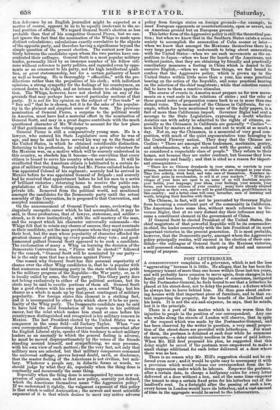POST LETTERBOX ES.
coanEsrorrmarr complains of a grievance, which is not the less " aggravating" because it is little. He alleges, that he has been the temporary tenant of more than one house within these last ten years, and will probably have occasion to move again, from changes in his family and business. Under the impulse of conscience, instigated by the Postmaster-General, he feels bound to see that a letterbox be placed at his street-door, not to delay the postman ; a fixture which he always has to leave fxhind him. He thus goes about endow- ing houses with that important piece of furniture, and to that ex- tent improving the property, for the benefit of the landlord and his heirs. It is not the six-and-sixpence, he says, that he minds, but it is the principle. There is a part of this matter which is even worse than the injustice to people in the position of our correspondent. Any one who walks along the streets of London will observe, that in spite of the request which was made by the Postmaster-General, and has been observed by the writer in question, a very small propor- tion of the street-doors are provided with letterboxes. For want of them, the postman is detained at each door while he summons the servants,—a delay entirely needless in the case of paid letters. When Mr. Hill first proposed his plan, he suggested that this delay might be saved if the postman were empowered to make a small charge additional for each letter delivered at a door where there was no box.
There is no reason why Mr. Hill's suggestion should not be en- forced even now ; and it would be quite easy to accompany it with a provision which would release our correspondent from the hi- deous oppressioa under which he labours. Empower the postman, after a certain date, to charge a halfpenny extra for every letter delivered at a door without a box, and at the same time empower the tenant to stop a certain fixed price for his letterbox out of the landlord's rent. In a fortnight after the passing of such a law, every house in London would have its letterbox, and a vast amount of time in the aggregate would be saved to the lettercarriers.


























 Previous page
Previous page